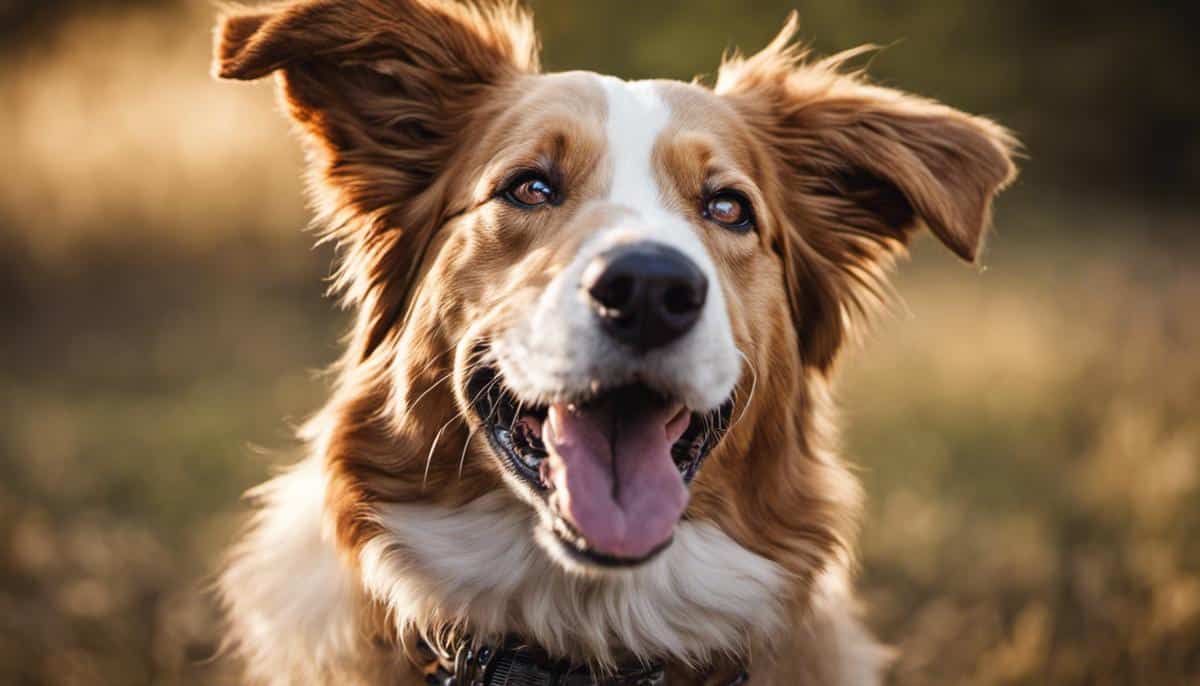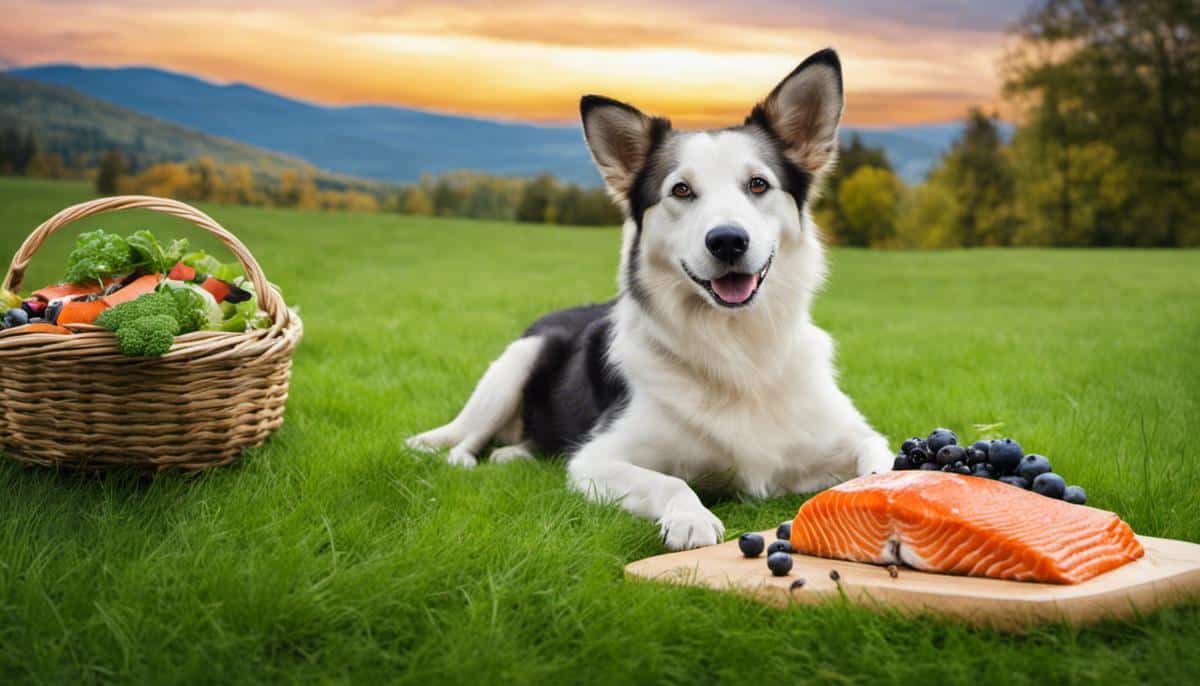
Living with a canine companion involves more than love and play: it also calls for understanding and appropriately responding to their behaviors and emotions – including anxiety. Canine anxiety is a common ability that often leaves pet parents feeling helpless and concerned for their furry friends.
The good news is, that dietary changes can make a difference in fighting against this pet ailment. Delving deep into pet nutrition and mental health, this discussion aims to reveal the nutrients essential for a canine’s mental well-being and the safe, calming foods that can be easily incorporated into their diet to lead a happier and stress-free life.
Understanding Anxiety in Dogs
Understanding Anxiety in Our Furry Friends: A Closer Look at Anxiety in Dogs
Dogs, often referred to as ‘man’s best friend’, are an integral part of many families. Just like humans, our four-legged family members can experience anxiety, profoundly impacting their quality of life.
So, what does anxiety in dogs look like, and why do they experience it? Let’s delve into this topic, so we can ensure our beloved pets are leading healthy and happy lives.
Firstly, anxiety in dogs is typically manifested through their behavior. It’s essential to note that dogs have unique personalities, so signs of anxiety can vary significantly from one pet to another. A dog might start indulging in destructive behavior such as chewing on shoes or furniture and excessive digging. Unusual aggression towards other animals or people, constant barking, or whimpering can also be telltale signs.
Other more subtle symptoms can include decreased appetite, changes in sleep patterns, or compulsively licking. Some dogs may even display signs of depression. Dogs are sensitive creatures and will rapidly respond to changes in their environment, which can lead to these anxiety symptoms.
So, why do dogs experience anxiety? A multitude of reasons! Changes in their living situation, such as moving to a new house or introducing a new pet or family member, can trigger anxiety. Certain breeds are also genetically predisposed to anxiety disorders, much like humans.
Another common trigger is separation anxiety which occurs when a dog gets anxious about being left alone. Unfortunately, this type of anxiety is often exacerbated since dogs can’t understand the concept of time.
Fear-based anxiety is another common type. It can be caused by a variety of factors including loud noises (think thunderstorms or fireworks), unfamiliar environments or people, and past trauma.
Incorporating a daily routine of exercise can be extremely beneficial to anxious dogs as it releases serotonin, a feel-good hormone, in their brains and helps manage anxiety. Comforting toys or blankets can also provide a sense of security during anxious episodes.
Understanding anxiety in dogs is vital as it can significantly affect their well-being. These pets are not just animals; they are cherished members of the family, deserving of love, care, and understanding as any family member would.
In the end, knowing the signs of anxiety and its triggers can allow for timely measures, ultimately fostering a happier, healthier life for our favorite furry companions. This way, we can ensure their tails keep wagging, bringing joy to our lives just as much as we strive to bring joy to theirs.

Nutrition Essential for Dogs’ Mental Health
Well, folks, in understanding our beloved four-legged family member’s anxiety, it’s vital to focus on their nutrition too. Much like humans, dogs can greatly benefit from the right nutrients in their diet, leading to better mental health. Bringing light to this aspect of canine mental health, here are a few vital nutrients, and trust me, their healthy supply could make a world difference.
Omega-3 fatty acids
Our four-legged friends could use quite a bit of these powerful nutrients. Known for promoting brain health, these fatty acids can also fight inflammation and keep your dog’s coat shiny. Fish, especially salmon, and flaxseed are excellent sources of Omega-3 fatty acids. Supplementing their diet with either of these can build a healthy routine for your pet- because we all know, a healthy dog is a happy one!
Vitamins
Just like Omega-3s, vitamins play a significant role in your pet’s mental health. Vitamin B1 or Thiamine controls anxiety and stress by affecting neurotransmitters in the dog’s brain. Foods rich in vitamin B1 include whole grains, beans, peas, and lentils. Also, Vitamin B6 and B12, found in chicken, turkey, and beef, deflect anxiety and increase brain health.
Yes, proteins! Proteins are more than just physical health boosters. They are necessary for the proper functioning of neurotransmitters, which affect moods and feelings of relaxation. Quality protein sources for dogs include chicken, beef, turkey, and lamb.
Minerals like Zinc and Magnesium also assist in mood stabilization in dogs. Zinc, which can be found in beef, lamb, and pork, plays an instrumental role in brain health and function. On the other hand, Magnesium, found in dark leafy greens and whole grains, aids in calming the nervous system.
Prebiotics and probiotics, these gut-healthy nutrients, aren’t just good for digestion. Recent studies have shown a link between good gut health and mental health, even in dogs. These beneficial bacteria can be found in fermented foods like yogurt, kefir, and dog-specific probiotic supplements.
Remember, our furry friends rely solely on us for their health and well-being. As we keep their meal plate diverse with these nutrients, let’s also ensure that they are getting adequate exercise, mental stimulation, and lots of love and care. Speak to a vet before implementing any significant dietary changes, because sometimes, our best intentions might not fit their unique needs.
Ensuring your dog’s mental health through proper nutrition isn’t just fulfilling our duty as pet parents but an avenue to show> our Fidos real love. After all, aren’t they more than just pets? They are family, and family is always worth our best efforts. So folks, let’s serve up some doggy health today!

Safe and Healthy Calming Food Options for Dogs
One approach to help manage anxiety in dogs, which mirrors effective strategies in humans, is through nutrition. What we consume greatly impacts our behavior and mood, and the same applies to our beloved pets. Here are a few nutrient-packed and dog-friendly food options that have the potential to support your dog’s mental health and alleviate symptoms of stress. Remember, before making any major changes to your pet’s diet, it’s essential to consult with a veterinarian.
Fatty Acids, like Omega-3, are impressive super nutrients with extensive benefits, including their impact on mental well-being. They are found in fish like salmon and sardines, both of which are safe for dogs to eat in cooked form and moderation. These fatty acids can help reduce anxiety by supporting brain health and promoting the production of serotonin—the body’s natural mood stabilizer.
Just as humans need B vitamins for optimal health, so do our canine companions. Vitamins B1 (Thiamine), B6 (Pyridoxine), and B12 can support nervous system function and encourage the production of serotonin. Foods such as chicken, turkey, and beef liver are high in these B vitamins. If you’re a vegetarian, there are dog-friendly plant-based options too, like sweet potatoes, spinach, and peas.
Protein is also key in maintaining a dog’s psychological health as it provides the building blocks for neurotransmitter production. Turkey is an excellent, dog-safe source of this nutrient, containing a key amino acid, Tryptophan. Known for its calming effect, Tryptophan aids in the production of serotonin and can contribute towards the relaxation and well-being of your furry friend.
Minerals like Zinc and Magnesium are often overlooked when it comes to mental health, but they also play crucial roles. Zinc helps regulate the nervous system, while Magnesium has a natural calming effect on the body. These two minerals can be found in a wide variety of dog-safe foods. Beef and pumpkin seeds are rich in Zinc, while Magnesium can be obtained from cooked Quinoa and Spinach.
Prebiotics and Probiotics support healthy digestion, which can indirectly impact your dog’s mood and stress levels. A healthy gut often translates to a healthy mind in both dogs and humans. Probiotic-rich foods include yogurts with live cultures, of course, provided your dog can tolerate dairy products. Prebiotics, which aid in the growth of beneficial gut bacteria, can be found in foods like asparagus, bananas, and apples.
Let’s not forget the importance of consistent exercise, mental stimulation, and a whole lot of love and care. Creating a safe, nurturing, and stimulating environment for your dog can do wonders in managing their anxiety and overall health.
It’s important to keep in mind that while nutrition can aid in managing anxiety, it’s not a fix-all. Each dog is unique, with individual needs that may respond differently to dietary changes. Above all, the well-being of our furry family members should be prioritized, acknowledging their values in our lives and homes. And as a gentle reminder, do consult a vet before making any drastic changes to your pet’s diet. They’re our best reference for personalized advice to create the most wholesome and stress-free life possible for our dogs.

Implementing Calming Food for Dogs
Having delved into the nuances of canine anxiety and its manifestations, it’s critical to explore some calming foods that can easily be integrated into a dog’s routine diet, another pillar of fostering a happier and healthier life for our beloved furry family members.
Omega-3 fatty acids, for instance, can be remarkably beneficial for dogs with anxiety. These healthy fats are found in fish like salmon and sardines and are known to promote brain health. They not only support cognitive function but also help to regulate mood. It’s simple to introduce more Omega-3 into your dog’s diet, for example, by adding a fish oil supplement, or by incorporating fish in cooked, unseasoned form.
With the flicker of interest in the power of B vitamins, their role in supporting a dog’s nervous system cannot be underestimated. Vitamins like B1, B6, and B12 often found in meats, whole grains, and legumes, can provide significant benefits. However, make sure to consult a vet before adding any supplements to your dog’s diet. Much like us, our dogs could use a bit of nutritional TLC.
Proteins are another big player in calming food for dogs! They’re vital for neurotransmitter production, directly impacting a dog’s disposition and mood. Lean meats, eggs, and certain dairy products can be excellent sources. Be mindful of your dog’s weight and dietary restrictions while adding new foods.
Minerals such as Zinc and Magnesium found in lean meats, fruits, and vegetables influence mental health by supporting the communication of nerve impulses. Just a dash of these minerals could do wonders. Again, it’s recommended to check with a vet first for appropriate portions.
Treat a day keeps the doctor away! Increasing dietary fibers like Prebiotics and Probiotics found in certain approved canine treats and yogurts could help in promoting a healthy gut. A balanced gut microbiome indirectly impacts mood; happy belly, happy pup, we say!
But, our love for our pets isn’t just about the meals we prepare for them. It’s about the walks, the fetch games at the park, the cozy cuddles, and the hide-and-seek games that stimulate their minds and help them burn off energy. Exercise and mental stimulation are outstanding non-dietary anxiety aids for our pets.
Last but certainly not least, it’s crucial to consult a vet before making any drastic changes to a dog’s diet. Everybody and everybody is different, and our pets’ nutritional needs are just as unique. Making changes to nutrition isn’t a magical cure-all. It’s one piece of a big, complex puzzle. Their symptoms, breed, size, age, and various other factors should be taken into consideration.
Incorporating calming foods into our dogs’ diets is no Herculean task. It’s about making small changes and being consistently patient. By doing so, we’re not just offering them a meal but providing them with a bowl full of care, comfort, and adoration – a wonderful treat for both our dogs and us, the family that loves them.
Starting on the road to a calming diet for dogs may seem daunting, but remember: that patience and consistency are key. Not only does this entail gradually introducing calming foods into your pet’s diet but also maintaining a steady diet regimen. Serving size is equally crucial, as overfeeding can lead to obesity and other health issues. Always remember, that the overall health and wellness of your dog should be a priority. With this guide, you’re more than equipped to start a positive transformation in your pet’s life. So, why not take the first step in ensuring their nutrition is contributing not only to their physical health but also to a calm and stable state of mind?
Legal Disclaimer
The information provided in this blog post is for informational purposes only and should not replace professional advice from a veterinarian or certified dog groomer. Always consult professionals for any serious grooming or health concerns involving your pet.





